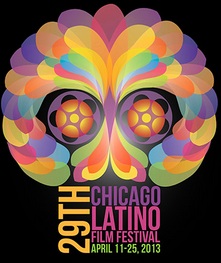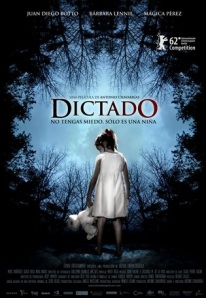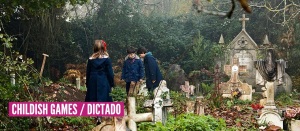29th Chicago Latino Film Festival
 WHAT: 29th Chicago Latino Film Festival
WHAT: 29th Chicago Latino Film Festival
WHEN: April 11 – 25, 2013
WHERE: AMC Loews Theatres 600 (600 N. Michigan Ave.)
FILM: Dictado (Childish Games)
RATING: Not Rated
DIRECTOR: Antonio Chavarrias
LANGUAGE: Spanish with English Subtitles
RUN TIME: 95 minutes
OUR RATING: Do It!
From humble beginnings in 1985 to the international recognized mega-festival we now celebrate, the Chicago Latino Film Festival (CLFF) organized by the International Latino Cultural Center is an explosion of creativity that brings the best of Latino filmic arts to the Chicago screens. With over 100 feature length films and shorts from the length and breadth of Latin America, there is literally a film for every taste, whether you’re interested in gritty social commentary, light-hearted comedy, or darkly fascinating thrillers.
Perhaps what makes the CLFF most innovative is that it highlights Chicago as a center of Latino culture within the United States, a distinction that might not be the first thing to come to mind. This internationalization has only positive effects, allowing for cross-cultural pollination and diverse understanding that transforms Chicago into a truly global city.
While the festival is two weeks long, we only managed to secure tickets to one show at this highly popular event, where tickets go for $11 per film. Dictado, a thriller in the style of Hitchcock, seemed to be absolutely up our street, and we even got the opportunity to participate in a Q&A with the director. Sit back, grab a popcorn and enjoy!
 Adam: Dictado, known in English as Childish Games, creates a psychological tapestry with deep, dark undertones that play on our deepest emotions. Above all, what would happen if an event from our childhood came back to haunt us with full force?
Adam: Dictado, known in English as Childish Games, creates a psychological tapestry with deep, dark undertones that play on our deepest emotions. Above all, what would happen if an event from our childhood came back to haunt us with full force?
In an intriguing story, childless couple Daniel (Juan Diego Botto) and Laura (Barbara Lennie) take in the orphaned Julia (Magica Perez), who is not everything that she seems, as she holds the key to unlock a repressed moment in Daniel’s childhood. Directed by Antonio Chavarrias, we see produced a beautifully compact piece that seems akin to a play in its intimacy and a high calibre film in its cinematography (Guillermo Granillo) – a melding that we do not often experience. Chavarrias makes us question the validity of our protagonists’ actions and memories, thus presenting a mysterious world that is both riveting and reflective.
 As the truth about Daniel’s past is slowly revealed (is it a descent into madness, or the opening of emotional floodgates, the waters of which he is unable to stem?), I was enthralled to see the unexpected and twistful realizations that make this film worthy of being included beside the likes of the great English Ghost authors such as M.R. James.
As the truth about Daniel’s past is slowly revealed (is it a descent into madness, or the opening of emotional floodgates, the waters of which he is unable to stem?), I was enthralled to see the unexpected and twistful realizations that make this film worthy of being included beside the likes of the great English Ghost authors such as M.R. James.
Drawing heavily from Greek tragedy, although perhaps not exploring it in the way you would expect, almost no violence occurs “on stage”, while the psychologies of the characters are fully untangled to explore the plot’s core horror. A much needed antidote to the regular blood and guts of the genre.
 Alicia: During our Q&A session with Chavarrias, he mentioned one of his influences being the infamous Frankenstein and the question of what makes one a monster and what factors influence an individual in thinking that they themselves are monsters, which *hint hint* is something that is beautifully explored here.
Alicia: During our Q&A session with Chavarrias, he mentioned one of his influences being the infamous Frankenstein and the question of what makes one a monster and what factors influence an individual in thinking that they themselves are monsters, which *hint hint* is something that is beautifully explored here.
The psychological exploration of violence through fear, rather than through malice, is another incredibly intriguing aspect of this film, and the filming of any violence in this movie is done with the intentions of beauty and sadness, rather than shock or grotesqueness.
How are monsters forged: by the monsters themselves, or by others? Rather than just thrusting us into a solution, Chavarrias lets us think about this in a more adult way. How responsible are children for their actions and do adults sometimes make things worse? One of the best Spanish-language films out this year, Dictado is a must-see.
Final Thoughts: The Chicago Latino Film Festival allows audiences across cultures to experience the enormous diversity of Latin America in this unique creative outlet, merging art with education, especially through discussions with local and visiting filmmakers which accompany a majority of the screenings. The festival’s wide array of programming allows moviegoers of all types to enjoy this multicultural exploration.
P.S.: Dictado is now available on DVD, but only as a non-US import. If you can play international DVDs, pick it up here and enjoy.

